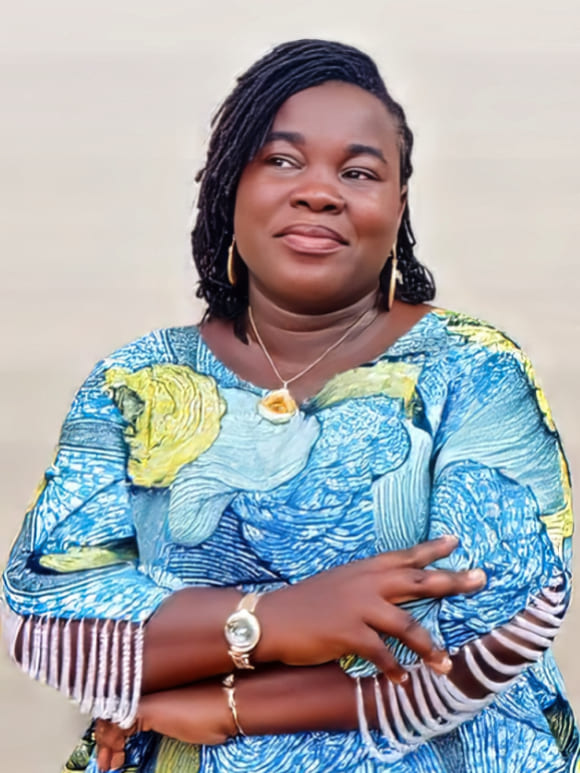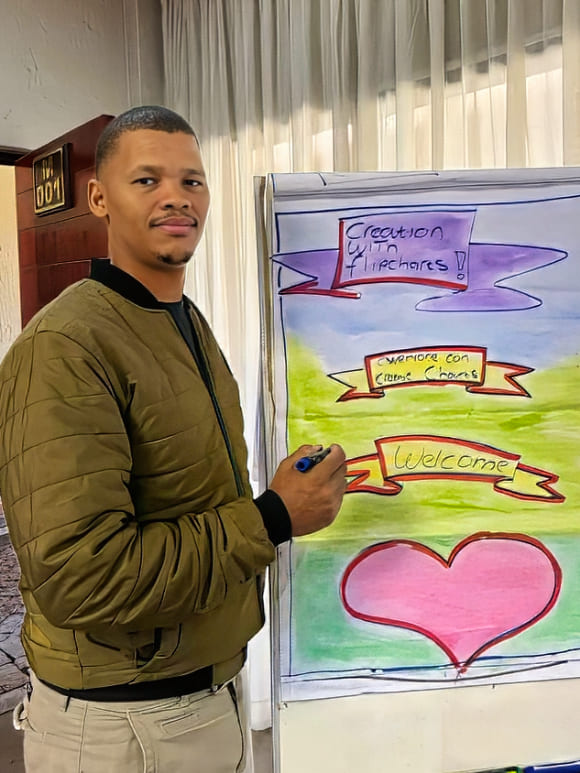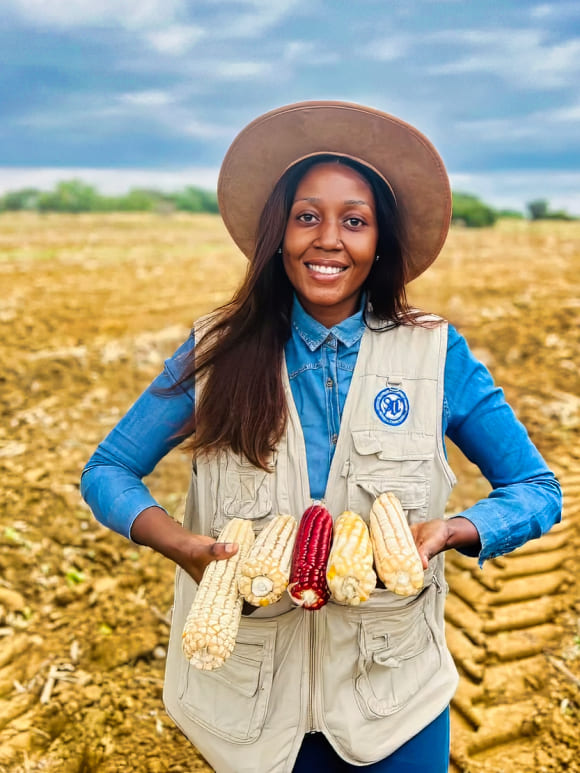Dorcas Joanita Akouete
 Dorcas Joanita Akouete is a young woman from Benin who is passionate about agriculture and family farming in particular. She lives in Darnon, a village in the municipality of N’Dali in the north of the country, and has a Master’s degree in animal and fish production. Today, she runs Terre d’Amazones, an agricultural company dedicated to producing and processing plant and animal products.
Dorcas Joanita Akouete is a young woman from Benin who is passionate about agriculture and family farming in particular. She lives in Darnon, a village in the municipality of N’Dali in the north of the country, and has a Master’s degree in animal and fish production. Today, she runs Terre d’Amazones, an agricultural company dedicated to producing and processing plant and animal products.
Her passion for nature originated in her childhood, when she looked after the pigeons, chickens and young goats at home every day. Spurred on by her father, she had no hesitation opting to study agricultural sciences, specialising in animal production and fishing. As the only one of six siblings to take up farming, she decided to settle on her parents’ farm, Ferme Akoeute et fils. She started with 250 broiler chicks. Today, she grows several types of grain such as corn, soya, rice and sorghum, keeps poultry and pigs and grows (leafy) vegetables and fruit together with her partner and her father.
For Dorcas Joanita, one thing is clear: “The earth doesn’t lie. It teaches us to understand the usefulness of challenges as true happiness”. This motivates her not to give up even in difficult times. One of their biggest challenges was the loss of an entire rice harvest, which was destroyed by fire before it could even be stored. It was a very painful experience, but her greatest pride comes from the moments when she is reaping the fruits of her labour and seeing the impact of her work: she is feeding the women and men of her community and her country.
Her entry into farmers’ organisations was initially motivated by a desire for networking and new opportunities. But it soon took on a broader role – particularly campaigning for the rights of women and young farmers. She campaigns for access to means of production, land, suitable financing and better information on agricultural policy decisions that often fail to meet the needs of farmers. As a result of this commitment, she joined the Fédération Nationale des Femmes Agricultrices du Bénin (FENAFAB) and the Collège des Jeunes Agriculteurs du Bénin, two influential organisations and members of PNOPPA .
Before the YLIP programme, Dorcas Joanita had already taken part in several leadership training courses. But the YLIP experience was different. It is a profound immersion that marks a real turning point: a place of inner transformation, a call to think differently, in-depth learning about dedicated leadership. “This process is continuous, because after each step you have to look in an inner mirror, adapt your leadership to the circumstances, learn how to guide others and help them to bring out the leadership personality in them,” says the young farmer.
Today, Dorcas Joanita manages to reconcile her family life, her commitment to farmers’ organisations and further developing her economic activities: this is the demanding everyday life of every woman who is involved in farmers’ organisations. She is pursuing her mission with a clear vision: she wants to arouse interest, inspire, accompany children and young people in this valuable, innovative and promising profession, because they are the future of food security and sovereignty.
 Devroll Legodi is a 30-year-old agricultural entrepreneur from South Africa. She is the fifth child in her family and has a diploma in financial management. She comes from a family that grew food for their own needs in their garden. She took the decision to go into farming herself during the COVID-19 pandemic.
Devroll Legodi is a 30-year-old agricultural entrepreneur from South Africa. She is the fifth child in her family and has a diploma in financial management. She comes from a family that grew food for their own needs in their garden. She took the decision to go into farming herself during the COVID-19 pandemic. Yussif Jesiwuni is a 30-year-old farmer and champion of rural development from Ghana. Yussif developed his passion for farming at an early age when he followed his father to the fields in northern Ghana. His love and passion for agriculture deepened further when he began working actively in rural development in 2015. He was fascinated by the beauty and lush green of the fields and by the rare opportunity to observe plants from germination after sowing through to harvest.
Yussif Jesiwuni is a 30-year-old farmer and champion of rural development from Ghana. Yussif developed his passion for farming at an early age when he followed his father to the fields in northern Ghana. His love and passion for agriculture deepened further when he began working actively in rural development in 2015. He was fascinated by the beauty and lush green of the fields and by the rare opportunity to observe plants from germination after sowing through to harvest.  Raymond Freyer, a 34-year-old farmer from Keetmanshoop in the Karas region of southern Namibia, is the fourth child in his family. He lives together with his partner, with whom he has two daughters. Although he has a diploma in tourism, he has always felt drawn to farming – a deeply rooted tradition on both sides of his family. Raymond works in one of the driest regions of Namibia on land that was given to him on a non-transferable basis. His motivation lies in overcoming challenges.
Raymond Freyer, a 34-year-old farmer from Keetmanshoop in the Karas region of southern Namibia, is the fourth child in his family. He lives together with his partner, with whom he has two daughters. Although he has a diploma in tourism, he has always felt drawn to farming – a deeply rooted tradition on both sides of his family. Raymond works in one of the driest regions of Namibia on land that was given to him on a non-transferable basis. His motivation lies in overcoming challenges.  Dorcas Joanita Akouete is a young woman from Benin who is passionate about agriculture and family farming in particular. She lives in Darnon, a village in the municipality of N’Dali in the north of the country, and has a Master’s degree in animal and fish production. Today, she runs Terre d’Amazones, an agricultural company dedicated to producing and processing plant and animal products.
Dorcas Joanita Akouete is a young woman from Benin who is passionate about agriculture and family farming in particular. She lives in Darnon, a village in the municipality of N’Dali in the north of the country, and has a Master’s degree in animal and fish production. Today, she runs Terre d’Amazones, an agricultural company dedicated to producing and processing plant and animal products.  Elizabeth Maanda Sianga is a 27-year-old agricultural entrepreneur from Zambia and the third child in her family. She does not yet have a family of her own, but she is investing a lot of time in the transformation of agriculture in her country, to which she has dedicated herself. Elizabeth has a Bachelor’s degree in agriculture and a Master’s in agribusiness.
Elizabeth Maanda Sianga is a 27-year-old agricultural entrepreneur from Zambia and the third child in her family. She does not yet have a family of her own, but she is investing a lot of time in the transformation of agriculture in her country, to which she has dedicated herself. Elizabeth has a Bachelor’s degree in agriculture and a Master’s in agribusiness.